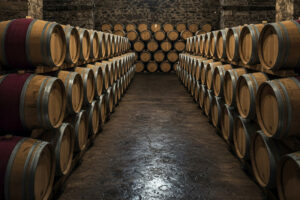It will have to be experimented in the field to test, evaluate and verify its effectiveness, but the results are quite promising. Immunrise, a small company in Bordeaux, found the solution or at least part of the solution to the threat of diseases that affect vines every year, in a microscopic alga. In vitro tests, as explained the article in the French wine magazine, "La Revue du Vin de France" (www.larvf.com), they have shown that microalga (of which the company did not disclose the name but only the origins, off the coast of Brittany, ed.), reduced to powder, is able to fight and defeat the fungus responsible for the main diseases decimating the tomato, apple, potato, wheat, banana and, most importantly, vine crops, of which France is the leading "consumer" of plant synthesis protection products.
According to tests conducted in the INRA - National Institute of Agronomic Research laboratories, the powdered seaweed has proved 100% effective in the fight against late blight, 50% against botrytis and is able to defeat four of the seven fungi responsible for Esca disease (which, according to data from the Ministry of Agriculture, covers 13% of the vineyards in France), a disease that devastates vineyards and against which there has been no treatment since 2001 when the EU banned the use of sodium arsenite, a highly toxic substance, responsible in the past for the death of a number of French winemakers.
It is a sustainable solution, in response to one of the most pressing issues concerning vines, which could cause 10% of French vineyards (80.000 hectares) to disappear in a few years, but must first pass the test in the fields, even though “100% efficacy in the laboratory is very encouraging, though it must be confirmed in the fields,” commented Marie-France Corio-Costet, researcher at INRA. “There are thousands of products that work during testing”, continued the researcher, “especially when it comes to fungicides, which then in real conditions do not always give the same results. However, in 2017 we will test the product in the Bordeaux vineyards, and if the results are confirmed we'll be looking at a major innovation in the field of bio-pesticides, where many people are working, but results are not sufficient”.
“We got lucky”, admits the co-founder of ImmunRise, Laurent De Crasto, oenologist and engineer, “in our choice of microorganisms to test”.
Copyright © 2000/2026
Contatti: info@winenews.it
Seguici anche su Twitter: @WineNewsIt
Seguici anche su Facebook: @winenewsit
Questo articolo è tratto dall'archivio di WineNews - Tutti i diritti riservati - Copyright © 2000/2026






































































































































































































